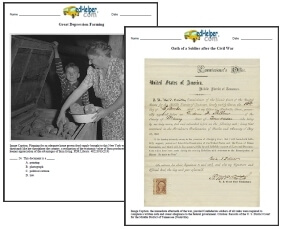
Worksheets and No Prep Teaching Resources
Reading Comprehension Worksheets
The 1950's

The 1950's
 Worksheets and No Prep Teaching Resources Reading Comprehension Worksheets The 1950's |
 The 1950's |
| edHelper's suggested reading level: | grades 7 to 9 | |
| Flesch-Kincaid grade level: | 7.01 |
|
M.A.S.H., Part 1 - A Look at Military Medicine
By Toni Lee Robinson |

|
 |
Create Weekly Reading Books
Prepare for an entire week at once! |
| Leave your feedback on M.A.S.H., Part 1 - A Look at Military Medicine (use this link if you found an error in the story) |
 |
The 1950's
|
 |
High School Reading Comprehensions and High School Reading Lessons
|
 |
United States
|
|
|
 | Fifty States Theme Unit |
 |
Document Based Activities |